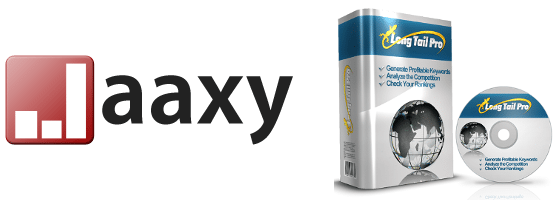
I have been a Jaaxy user for about four years now, but have been hearing a lot about another keyword research tool called Longtail Pro so I decided to download it an compare the two.

Are You Ready To Work Your Ass Off to Earn Your Lifestyle?
Are you tired of the daily grind? With a laptop and an internet connection I built a small website to generate income, and my life completely changed. Let me show you exactly how I’ve been doing it for more than 13 years.
Could it be the first Jaaxy VS Longtail Pro post in the history of the internet? I think so. Please feel free to congratulate me in the comment section 🙂
Longtail pro is actually the more widely used of the two tools, and is quite popular among niche website makers, especially the tribes that follow Spencer Haws (creator), Pat Flynn, and a couple other famous niche guys.
So where’s the Jaaxy love?
Well, Jaaxy’s a newer tool. Jaaxy’s user base is also primarily members of Wealthy Affiliate, the online business community where I learned how to build my first niche websites. Just guessing. It’s really not that important, but I wanted to give you a bit of history before we get into the actual comparison of the two tools.
I’ve recently updated this comparison, so it should reflect the changes to the two tools as of 2017. Please feel free to make any corrections or add your own opinion in the comments. For starters, here’s the winner in my opinion:
Final Conclusion
- Jaaxy: 4 Points
- Longtail Pro: 2 Points
- Tie/Undecided: 2 Points
First I’ll do a mini Jaaxy review, then a mini LTP review, then a side by side feature/performance comparison. ==> Skip to the comparison
Jaaxy Review
Information Jaaxy Provides
- Monthly Searches
- Expected Traffic
- QSR (quoted search results, true competition)
- KQI (keyword quality index, overall keyword quality)
- SEO Power (score based on traffic, QSR, competition)
- Domain availability for keyword

The first unique thing you’ll notice about Jaaxy is that the numbers it gives you will be unlike many other tools out there. Monthly searches and expect traffic are a number determined by algorithm, not just taken from Google’s keyword data. Google gives notoriously inflated numbers, so while you might see an 4500 searches from Google’s tool (and Longtail Pro in this case), Jaaxy will usually give you a much smaller number.
The same goes for the resulting traffic you’ll receive. Jaaxy takes their data from a number of different sources and combines the data into one number.
QSR is another thing that no other tool does, and a lot of people don’t understand, therefore don’t pay attention to.
The “quoted search results” is the number of results that come up when you search for a phrase in quotes. So instead of searching for ‘keyword phrase here’, you’ll search for ‘”keyword phrase here”‘. That’s really hard to explain in writing, so here’s a picture:
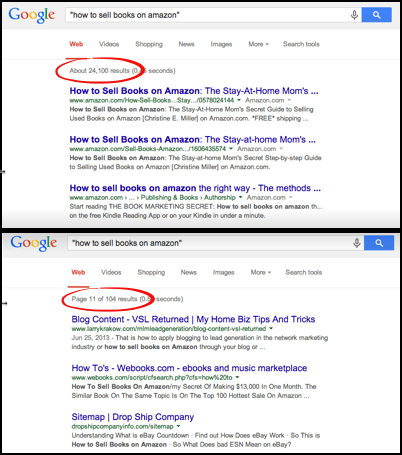
Why does this matter? That’s your ‘true competition’. True competition is the number of websites ranked in Google that contain that exact phrase.
Although Google will initially give you a result like 5 million pages, if you dig past page one, that number gets more accurate, and on low competition phrases you might discover that less than 100 websites actually contain that phrase. Whether that’s a real number of if it’s shaved off by Google using some kind of algorithm, I don’t know. But if the big G doesn’t think those results are relevant, neither should we.
Competition Analysis
Outside of QSR you can also dig into the top 10 results of Google searches and find information about the websites that rank.
You can view:
- Title
- URL
- Meta Description
- Meta Keywords
- Word Count
- Links on site
- Alexa Rank
- Keyword Density
- Backlinks
- Page Rank
Other Features
There are two other features of Jaaxy that I use regularly. One, is keyword lists. I love having the ability to sort my research into lists and store them within Jaaxy. Each list stores all data related to the keywords, and even gives an overview of how many keywords in a list and the traffic you can expect from that list.
I haven’t done it, but I’ve always wanted to try selling some keyword lists. How cool would that be?
100 keywords, 30,000 visits per month, $19.95. Maybe one day 🙂
The other feature that I use a lot is the rank tracker. You can track the rank of any domain for any keyword. Usually you’ll want to track your own of course, but it’s nice to spy sometimes.
Unfortunately they don’t keep historical data for the tracker, so you if you are wanting to see your rise and fall (hopeful not) over time, you’ll have to store that on your own spreadsheet. It does keep your searches though, you can scroll back and see rank-tracks you previously searched. *Jaaxy now tracks your rank over time!
There are other features of Jaaxy that I don’t use as much. You can read about them in my full review, but they don’t play a role in my comparison to Longtail Pro.
Longtail Pro Review
So I’ll be the first to admit that I’ve spent less time with this tool, so I have less to say about it. I will say however, that I know a lot of pros that use it, which is why it was the first tool I ventured out to compare to my own go-to-guy.
I’m going to discuss some of the features in the Longtail Pro section, then spend a few paragraphs comparing it to Jaaxy in the next section.
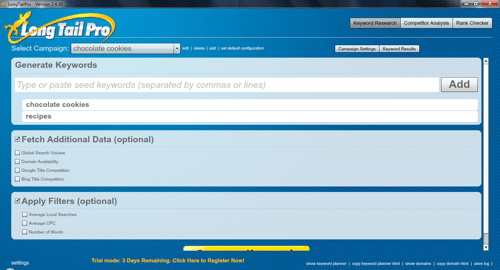
Features & Results
- Global Search Volume
- Local Search Volume
- Domain availability
- Title Competition (Bing/Google)
- CPC (cost per click, an indication of paid advertising competition)
- Rank Checker
The information in LTP seems to be heavily dependent on Moz and Google’s own tool for Adwords. Perhaps it’s just taking from Moz and Moz is taking from Google.
Unless you create filters and limit the number of results, you can get up to 800 keyword results in one search. This is quick way to list out your blog post for the next 3 years, but looking at that amount of data in one go is a bit overwhelming.
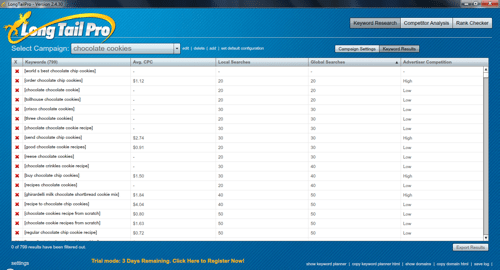
Moz
It seems impossible to talk about LTP without discussing a bit about Moz. After you get your keyword results, you can dig into each individual keyword to see more detailed information about the top 10 results of Google for that search term.
The data you’re given is:
- Page Authority (Moz number)
- Page Links (total number of links, internal/external)
- Juice Page Links (Inbound links that pass link equity)
- Domain Authority (Moz number)
- mozRank (Moz number)
- Page Rank
- Site Age
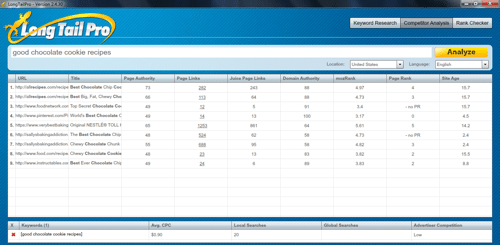
For Moz fans out there, this is a great way to consolidate data you’d get from them, and basically compare your top competitors based on these metrics. They do know a lot about websites, and looking at the data they have for my own sites, I can see that a lot of it is accurate.
(this is also a very cheap way of accessing this data because a Moz membership is quite expensive in my opinion)
However, not all of it is exactly correct, and not all of the numbers displayed for LTP carry weight on rankings. Page rank and site age are two numbers that jump out at me as things I don’t really pay attention to, as you can see lots of PR 0 sites ranking on page 1 for search results, including my own.
But before I get too critical, I will say that this is just a measure of approximate competition. Even QSR, the number that I’m used to paying attention to is not an infallible metric. In fact, an old + high PR site without an exact term could definitely outrank a new/low PR site with the exact search term.
Since I’m already starting to compare and there aren’t any other features of LTP that don’t warrant comparison, let’s get into what the difference is between Longtail Pro and Jaaxy. It’s quite hard to write them in order of importance, so I’m just going to go through my list, and you decide what’s important at the end.
There’s quite a bit, so if you want to tl;dr it, there will be a final conclusion at the bottom.
Jaaxy Vs Longtail Pro Feature Comparison
Rank Tracker
Winner: Jaaxy
Jaaxy now track your rank quite effectively. You can also update your rank tracking automatically, for daily, weekly, bi-monthly, or monthly. That means it will automatically check your position for keywords over time. With an Enterprise version, you get 50,000 automatic searches, so it’s more than you would need unless you were running a flotilla of websites.
Longtail Pro also has a rank tracker. It shows similar, but different results than Jaaxy. However, your rank tracking is severely limited, which is detailed in my full LTP review. Yes, it’ll show your rank, but will only update when it feels like it, so it feels very limited. With Jaaxy you can do individual rank tracking on the fly, or track over time, according to how often you want to update.
![]()

Keyword Research
Winner: Jaaxy
The most important feature of these tools, and I can’t pick a winner? Well, it’s because both do good jobs, in different areas. Longtail Pro provides MORE data, so you can more information to sort through to make your decisions. For an experienced SEO, that’s great. For a newbie, it’s overwhelming.
Jaaxy provides a more refined list, and though there are not as many results listed, it’s very easy to dig deeper with a new search and simply add more keywords to your saved lists.
For example, if I search for “natural caffeine” and “green coffee” turns up in the results, I only have to click “green coffee” and Jaaxy will start a new search based on that term. If I want to go back to my previous results, I can check my search history. For newbies Jaaxy +1. For experienced SEO’s, LTP +1
After updating my review in September 2017, I see that LTP added a new “filter” feature, where you can search for keywords based on a “seed” keyword, but exclude certain results.

So if I search for “microwaves”, I can exclude the word “buy” from my search results, since I don’t want to try to rank for “buy stainless steel microwaves”. I can also limit results to a number words in the phrase, so results like “new microwave” doesn’t turn up. I only get the best of the best results! LTP +2 right here.
However, one good reason to use that you have limited number of results you can view. Each result, even crappy ones, knocks one point off your total allotted for the month. Jaxxy has unlimited searches. Jaaxy +1
Also, Jaaxy has a much easier system of organizing your search results into spreadsheets or text docs with the keywords and stats. Jaaxy +1.
Then, with the new improvements, in 2017, you also have alphabet soup, which gives you a TON of related results that can help you find relevant phrases that use your keyword. It’s like Google Instant on crack.
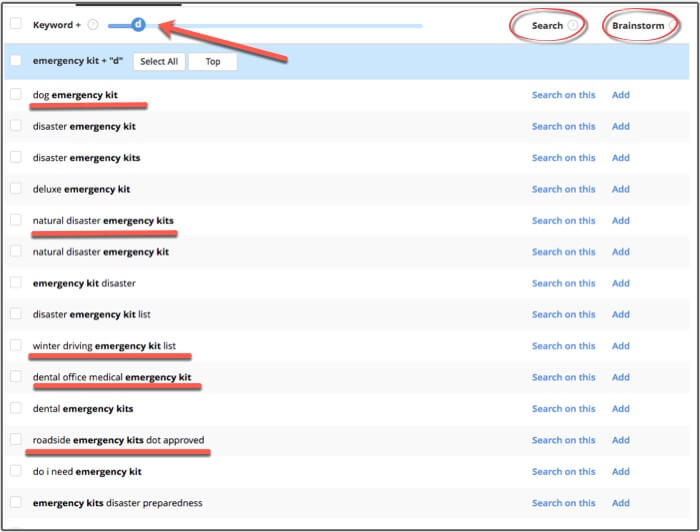
I much prefer Jaaxy’s method of organized keyword research, plus the tools that help you find ideas to write about, rather than spending 100 years trying to find the perfect keyword that will be easy to rank for an make a million bucks. In my experience, I have made more money writing about interesting topics consistently, rather than trying to build a perfect site made of precision keywords.
Competition Analysis
Winner: Longtail Pro
Which competition numbers you pay attention to is going to be a decision that every niche marketer will decide for himself/herself.
Personally, I find that QSR is enough for me. However, the competition analysis in Longtail pro is more comprehensive, and takes more factors into account. Sometimes, QSR is simply not enough to accurately tell if you can outrank a website.
If you see a keyword like “buy camo cargo shorts online”, it’s guaranteed to have a low QSR. But you can also bet that it’s going to be Amazon, Walmart, and Bass Pro on page 1 of Google, which is going to be pretty hard (not impossible) to outrank. There’s simply not a lot you can say about buying cargo shorts online that will impress Google.

However, consider that building a website, you should have world domination in mind, so I don’t really care what PR or Moz rank the leading sites have. In fact, my MOZ rank for One More Cup of Coffee is only about 27/100, which is quite low for a 7 year old website with 1500 posts. Still, I can rank very well, sometimes in the #1 spot within hours for low competition keywords.
What’s the point of knowing your competitors rank if you’ve got a great website?
But if you are planning on building a small niche website to flip online, or as part of a portfolio of niche websites and don’t want to build it out into a huge authority site, you will want to pay attention to things like domain age and other detailed metrics to properly suss out your competitors.
I’m not quite sure how the title competition works in TLP, but the numbers that I saw in my tests looked extremely high for Google, and Bing resulted in 0’s across the board, so I’m not convinced this is a metric I’d recommend paying attention to.
Back to Jaaxy: The ability to see things like keyword density, meta descriptions/titles, and word count can tell you a bit about the ranking page’s on-site SEO.
Both tools have features I like in this category. If Jaaxy had Domain Authority and Site Age, that would be perfect. If LTP showed the meta data, keyword density, and word count, that would be awesome too.
User Experience, Tool Usability
Winner: Jaaxy
Jaaxy is web based which means I can use it anywhere, on any computer. I wouldn’t use it on my phone, but tablet, PC, and laptops are part of my weekly routine. Jaaxy is also very intuitive, user friendly, and well designed.
LTP is software, which means you have to have it installed on every device you need it on. Since it still needs to connect to the internet to work, advantage for the big J here. Updates can be an issue. Longtail Pro hands you a lot of data, so it can be confusing to look at in the beginning.

Customer Support
Winner: Longtail Pro
I haven’t personally tested LTP’s support, but a buddy of mine Chris, from Media Fresh Press sent a few questions and they were answered within hours of sending them in.
Jaaxy’s support is non-existent. I hate to say it, but I think emails to them through the main website just go to an email address that no one reads.
To get support with Jaaxy you need to be a Wealthy Affiliate member, and contact the owners directly, or ask the community. There are many folks in there that use it regularly, and can answer your questions quite quickly, sometimes within minutes. That’s the advantage of crowdsourcing. Still, needing to pay an additional $49/month (cost of WA membership) for support is silly.
Overall Cost
Winner: Jaaxy
Jaaxy is $49/month for basic, $99/month for Enterprise. The main differences between the two are 1) returning numbers instantly, 2) ability to sort data based on keywords/competition/traffic. With their new update, the number of automatic searches is also increased for Enterprise members who might be tracking rankings for several websites, including client websites. Discounts available for yearly members. All accounts come with unlimited searches.
You get 30 free searches on the free version of Jaaxy, but some results are blurred out so you don’t get full access to the tool.
Lontail Pro has changed their prices a few times. They currently have options for $25, $67, and $147 per month. It looks like the only difference between the plans are the number of keyword searches you are allowed. The numbers are 10,000, 25,000, and 60,000 keyword searches.
Looking at it from pure dollar amount, LTP has the cheapest option of $25 per month. However, their Agency plan is $147, which is a lot more expensive than the Enterprise version that Jaaxy offers. What value you get from the tool will determine what cost you can justify. Personally, I find more value in Jaaxy’s features, so I think the basic account for $49 is the best for beginner online marketers. My vote here is with Jaaxy, but I could see if someone see more value for the LTP Starter Plan.
Overall Accuracy
Winner: Undecided
In the end, neither of these tools is going to give you the EXACT data you can expect from writing a post on the keywords they churn out. They are just tools, projections, and guesses based on historical data and other metrics. That being said, I feel that Jaaxy data is much closer to what happens in real life than what’s shown in LTP. Expected traffic often very close to what Jaaxy projects, and Moz doesn’t even give this number. As far as monthly searches go, I know that Jaaxy pulls from a number of sources, while it seems that LTP only uses Google. Another case for the former being more accurate.
If you are not used to seeing these numbers, it may seem “off” to you. Why is adwords telling me there are 45,000 searches and this thing is telling me there’s only X amount? Look at your traffic from ONE keyword you rank for, and see how it compares.
That being said, as far as competition goes, I feel that LTP gives you a closer look at what type of competition you are up against for a particular keyword. Though I don’t use Moz and often don’t pay attention to things like Domain Authority or Page Rank, they do play a factor into who’s ranking for what.
But I will add that it’s completely possible outrank those with better stats than you, and there’s always room to improve your own site over time. I know for a fact that my Moz numbers are crap, but I make a full time income from just this one website – A silly score like that is no indication of how much money a site makes.
Final Conclusion
Jaaxy: 4
Longtail Pro: 2
Tie/Undecided: 2
There’s a lot of information here for you to digest, so I’m sure you’re now wondering – which keyword tool is best for me?
If you are a member of Wealthy Affiliate, the clear advantage is for Jaaxy. The keyword data is easier to digest and more refined, the searches are faster, and I feel the competition information is more relevant to what I want to know.
Creating keyword lists is extremely helpful to me in making niche websites, and I feel that is also much easier to do here.
If you are not a WA member, then you need to decide if you can use the tool independently. If not having support isn’t a big deal to you, then at least try Jaaxy Pro and see if you like it. Again, I feel the data is more relevant, and more aligned with my style of research/marketing. Also, considering that the traffic numbers are more accurate than LTP, I feel it’s a better tool overall.
If you have no intention of being a paid member of the WA business community, and want the option to contact a support team with questions about the tool (including the owner on his blog or in social media), then Longtail Pro gets the clear advantage here. If Jaaxy decides to start providing support outside of the WA community I might be able to give it a better recommendation in this area.
Get 30 Free Searches on Jaaxy
Get a 7 Day Free Trial with Longtail Pro
Questions
- Have you used either one or both of these tools?
- What features did you love/hate?
- Which one are you currently paying for?
- Are there features you feel that they are missing?

Nathaniell
What's up ladies and dudes! Great to finally meet you, and I hope you enjoyed this post. My name is Nathaniell and I'm the owner of One More Cup of Coffee. I started my first online business in 2010 promoting computer software and now I help newbies start their own businesses. Sign up for my #1 recommended training course and learn how to start your business for FREE!

 Is Shopify The Best Ecommerce Platform Out There?
Is Shopify The Best Ecommerce Platform Out There?
Arthur Siew
mmmm, I use Jaaxy keyword tool but sometimes, I tried to target low QSR keyword but sometimes, the keyword does not seem to rank. Not sure where I am doing wrong.
Nathaniell
How are you using keywords in your articles?
Jay
Hi Nathaniell,
I’ve come to trust your posts and opinions over the last couple of years, so would be great if you could update this after re-reviewing LTP as it’s now changed it’s business model.
There is no longer a one off fee and there is now a plat version with more features plus “Lontail University” training videos for the software that come with plat price and much of the way it works from what I’ve been reading. Would also love to know if the LT uni training videos are any good and worth the extra.
Love the article, thought overall it was pretty well balanced seeing as you are a long-term Jaaxy user and haven’t used LTP for long, but would be great to have your experienced insight into the new features of LTP (both plat and none plat versions) plus the training and the pricing model changes.
Any chance of that?
Best regards,
Jay
Nathaniell
Great idea! I’ll try to get to that ASAP. Thanks for the thoughtful comment and suggestion Jay.
Kyle
Great article.
I am a Long Tail Pro user and it has been great for me. My main gripes with Jaxxy are the price and the lack of support. While you make some good points about inflated numbers in LTP, the info it gives me invaluable information about the competition. You knock the site age metric a little bit in your article, but that is a great way for me to measure the kind of competition I am up against. If I see some young websites, it tells me that there is probably some potential for growth in that keyword.
I do wish that LTP was an online tool like Jaxxy though. That being said, as a member of WA, I have access to their keyword tool which gives me a quick and dirty look at some keywords if I’m away from my personal computer.
Both tools have their merits, but I give the edge to LTP simply because there is more support available for it. At the end of the day though, it just comes down to personal preference.
Nathaniell
Thanks for your input Kyle! I think whichever tool you use, you’ll get used to it and figure out the quirks. No tool is perfect, but it sounds like you have a good system going with LTP and using the free WA keyword tool.
Joan Adams
I have loved Jaaxy for years, and am shocked about the support. Is there no way to contact them? New user in our group has a question.
Nathaniell
If you are a WA member, send a PM to Kyle or Carson, or post a question in the forum. If you are not a WA member, you can try sending an email and see if someone responds, but don’t hold your breath!
pitin
Hi Nathan. I just unsubscribed from Jaaxy because I cannot understand why it is giving me different results from what I get inside the WA keyword tool. I am trying to use long tail keywords now as advised by senior WA members but I am having a hard time doing it inside WA kw Tool. Maybe I’ll try LTP. Thanks for this post
Nathaniell
The results should be the same as the WA keyword tool. Just keep in mind that what you find in Longtail Pro may be quite different from what you see in Jaaxy!